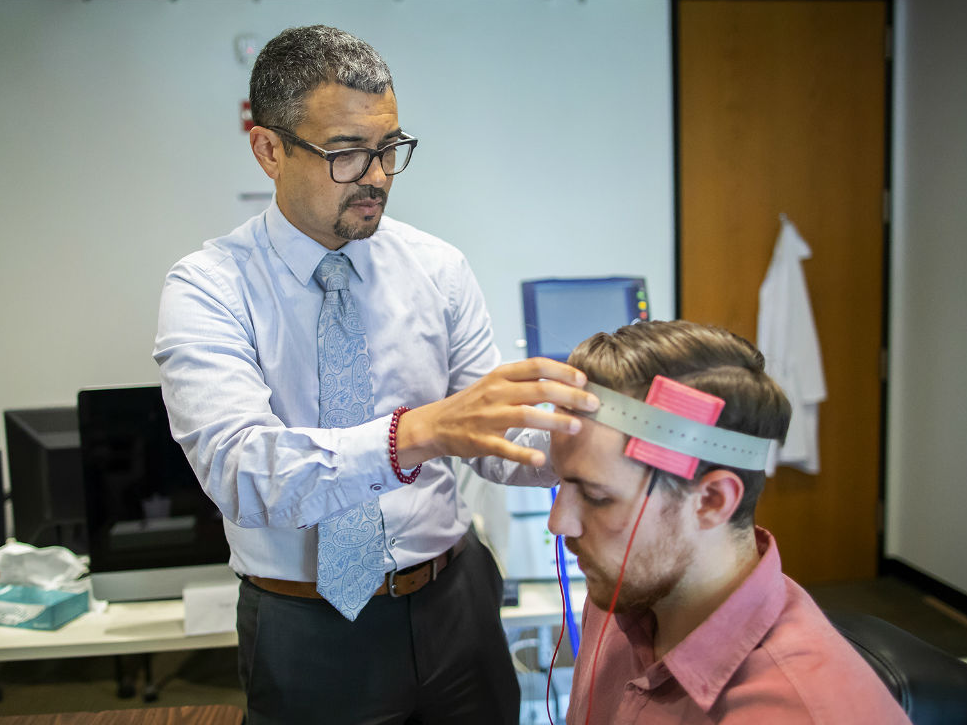- A lot of how the brain controls our impulses remains a mystery.
- But there are some areas, such as the dorsolateral prefrontal cortex, which have been linked to antisocial behaviour.
- Scientists have shown stimulating this area to boost its activity could reduce people’s violent tendencies.
- In other words, it’s the opposite of a lobotomy to remove the problem area.
- There is more work to be done, but the researchers are hopeful their treatment could be used on violent criminals in the future.
Neuroscientists are fairly certain of the functions of many areas of the brain. For example, the prefrontal cortex is the part of the brain associated with our complex ideas and behaviors.
But the organ also holds plenty of mysteries, such as why some people are incurable psychopaths, or why after a traumatic brain injury someone’s personality can completely change to become violent and aggressive.
In a new study, published in the journal Journal of Neuroscience, researchers from the University of Pennsylvania and Nanyang Technological University attempted to answer questions about violent behaviours, and whether someone’s criminal tendencies could be controlled with brain stimulation.
They recruited 86 adult participants, half of whom were given 20 minutes of non-invasive brain stimulation, half of whom were not. Then, they were asked to read two hypothetical scenarios, one about a physical assault (someone smashing a glass over a person’s head for chatting up his girlfriend) and one about a sexual assault (where intimate foreplay led to rape).
Immediately after hearing the stories, the participants were asked to rate how likely they were to behave as the protagonist had. Those in the group who had the electrical stimulation were 47% and 70% less likely to relate to the person in the story committing the crimes.

"The ability to manipulate such complex and fundamental aspects of cognition and behavior from outside the body has tremendous social, ethical, and possibly someday legal implications," said Roy Hamilton, a neurologist at Penn's Perelman School of Medicine and senior author of the study.
The team zeroed in on the dorsolateral prefrontal cortex in the top, front area of the brain because it is an area that has been linked to antisocial behaviour in previous research.
"We chose our approach and behavioral tasks specifically based on our hypotheses about which brain areas might be relevant to generating aggressive intentions," said Hamilton. "We were pleased to see at least some of our major predictions borne out."
A frontal lobotomy, a highly invasive surgery of the prefrontal lobe, was used in the past to treat mental illness and violent criminals. Psychologist Adrian Raine, a Penn Integrates Knowledge professor and author of the study said the stimulation technique is completely different. Rather than remove parts of the brain that may potentially be at fault, it may be more beneficial to stimulate them instead - boosting their activity.
"We're saying the opposite," he said. "That the front part of the brain needs to be better connected to the rest of the brain."
He added that they only performed 20-minute sessions, and they saw an effect. "What if we had more sessions? What if we did it three times a week for a month" he said.
However, there is still work to be done. Results of the study showed people were more morally opposed to the acts, but the likelihood of them actually committing an act - sticking pins into a voodoo doll - didn't change.
But with further research, the authors are hopeful a similar treatment could be offered to convicted criminals in the future, alongside traditional interventions like cognitive behavioural therapy.
"This is not the magic bullet that's going to wipe away aggression and crime," said Raine. "But could transcranial direct-current stimulation be offered as an intervention technique for first-time offenders to reduce their likelihood of recommitting a violent act?"
Perhaps, said Hamilton, "the secret to holding less violence in your heart is to have a properly stimulated mind."


